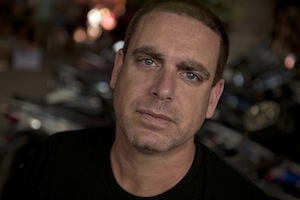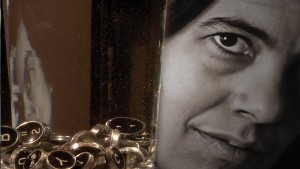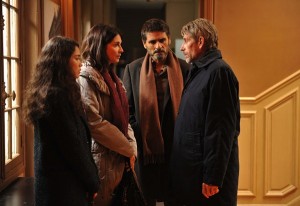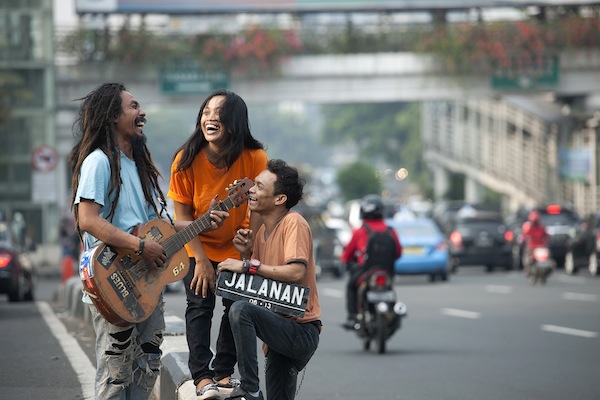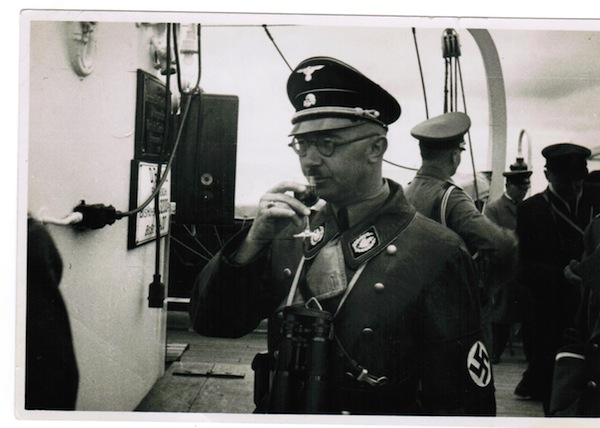In Love, Theft and Other Entanglements, Sami Metwasi plays Mousa, a likable but unlucky car thief. (photo from Vancouver International Film Festival)
Men in turmoil. If there were a common theme between the films the Jewish Independent reviewed in anticipation of this year’s Vancouver International Film Festival, which opens Sept. 24, it would be that. It also seems to apply to the other few movies in the festival with Jewish- and/or Israel-related content.
Of the films reviewed, Love, Theft and Other Entanglements (Palestine Territories) was the most engaging, though it was slow in its pacing. This was likely done purposefully to reflect aspects of the main character and his milieu, but the movie – which is described by director Muayad Alayan as “a drama, a thriller and a fairytale” – would have been more intense if several lengthy shots had been trimmed even by a few seconds. We don’t have to see a car drive from Point A to Point B to know that it went from A to B, for example.
That being said, Love’s Mousa, is a likable “hero,” and this makes viewers want to stick with him to the end. The choice to film the movie in black and white was made, says Alayan on the film’s website, to minimize “the visual noise that detracts from the story” and reduce “the temptation to examine the setting of the film against the hyper-realistic images of Palestine common in TV reports and documentary films. I wanted the place to be a context that serves the story and not a point of interest in and of itself.” In this, he succeeds. While the film includes evident commentary about Israeli and Palestinian societies, as well as the conflict between them, it is Mousa – representing anyone who has made some bad choices in life – who is at the centre of the narrative; and the desert landscape accents his scarce hope.
Walking out on a job that his father arranged for him with some effort, Mousa steals a car – not his first. Unfortunately, this one has valuable cargo in the trunk and Mousa becomes a man of interest – and use – to both Israeli intelligence and Palestinian militia. Adding to his self-made burden is an affair with a married woman.
Mousa desperately wants to flee from it all. When he tells his father he is leaving, his father responds, “A man who doesn’t solve his problems in his own country, won’t be any different in another country. You’re just running away.” By the end of the film, Mousa is no longer running.
***
Hockney is a flattering documentary by Randall Wright (United Kingdom/United States) of British artist David Hockney. It portrays a creative, innovative man who lived his life publicly, not only explicitly wrestling with his homosexuality in his artwork, but filming many moments of his life, some of which are very intimate and, one would think, private.
By turns flippant (deciding to become a blond after seeing a Clairol commercial that claimed blonds have more fun), sad (mourning with every aspect of his being the end of his relationship with Peter Schlesinger) and serious (continually pushing artistic boundaries and learning new techniques), Hockney is a fascinating person.
Wright’s documentary features interviews with Hockney, 77, as well as Hockney’s family and friends, fellow artists, subjects of his paintings and others. For the film, Hockey – who still works in the studio every day – provided Wright with access to his photographs and “home” movies. Hockney was a documenter not just of what he saw around him in people and nature, but of himself. “I always wanted to see more,” he says about why he always wanted to sit on the top level of the bus on the way home from the pictures – he describes himself as almost being raised with Hollywood, though he was born and raised in Bradford, England. After several stints in Los Angeles, he moved there in 1978.
The documentary serves as an interesting and visually stimulating, if uncritical, introduction to Hockney and his work. The VIFF screenings mark its Canadian première.
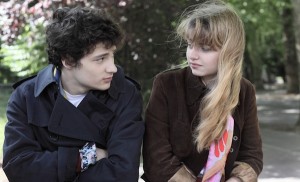
Another national première is My Golden Days, directed by Arnaud Desplechin (France). Actor Quentin Dolmaire, who plays the young adult Paul Dédalus, is scheduled to attend the screening.
Called Trois souvenirs de ma jeunesse in its original French, the film begins with the adult Paul in bed with a lover, saying goodbye, set to return to France to take a position with the foreign ministry. His first souvenir (memory) is of his childhood: to understate matters, he doesn’t get along with his mother, who is ill, and, after she dies, his father never recovers and fades into the background of his children’s lives.
Paul’s second memory – and the most interesting part of the entire film – is triggered when he is stopped at customs. Apparently, another Paul Dédalus exists in Australia, with Paul’s same birth date, etc. How can that be?
It goes back to the 1980s and a high school trip to Minsk. Not Jewish himself, Paul helps his friend Marc Zylberberg smuggle documents and money to refuseniks. He is asked, not pressured, to “lose” his passport when he meets with them, which he does.
The strength of character Paul displays at 16 in Russia escapes him upon his return. The third and final memory of his youth takes up more than half of the two-hour film. Despite including some violence, lots of emotional chaos and a few sex scenes, the romance between Paul and Esther is, not to mince words, boring. Though well-acted, the characters are not compelling or sympathetic, and it is hard to care what happens to them and their relationship.
***
The Jewish Independent is sponsoring the Canadian première of Tikkun, directed by Avishai Sivan (Israel). Among other awards, it won top honors at the Jerusalem Film Festival.
When Haim-Aaron, an ultra-Orthodox scholar, collapses and is resuscitated by his father after being declared dead by paramedics, he completely changes personality. While he struggles with that and his new lack of faith, his father is fearful that God is angry for having His will (that Haim-Aaron die) denied.
Among the other films of Jewish interest is Son of Saul, directed by László Nemes (Hungary), which takes place in Auschwitz, where Saul is forced to help the Nazis kill his fellow Jews. In doing so, he sees the corpse of a boy he believes to be his son. He decides to save the body, intent on giving the boy a proper burial.
And there is A Nazi Legacy: What Our Fathers Did, a documentary by David Evans (United Kingdom). Another Canadian première at VIFF, the film follows Niklas Frank and Horst von Wächter, both the sons of Nazis responsible for thousands of deaths, on a trip to Poland and Ukraine. The men have completely different opinions about their fathers’ actions during the war, and “human rights lawyer Philippe Sands investigates the complicated connection between the two men, and even delves into the story of his own grandfather who escaped the same town where their fathers carried out mass killings.”
VIFF runs from Sept. 24-Oct. 9. The full program can be found at viff.org.



